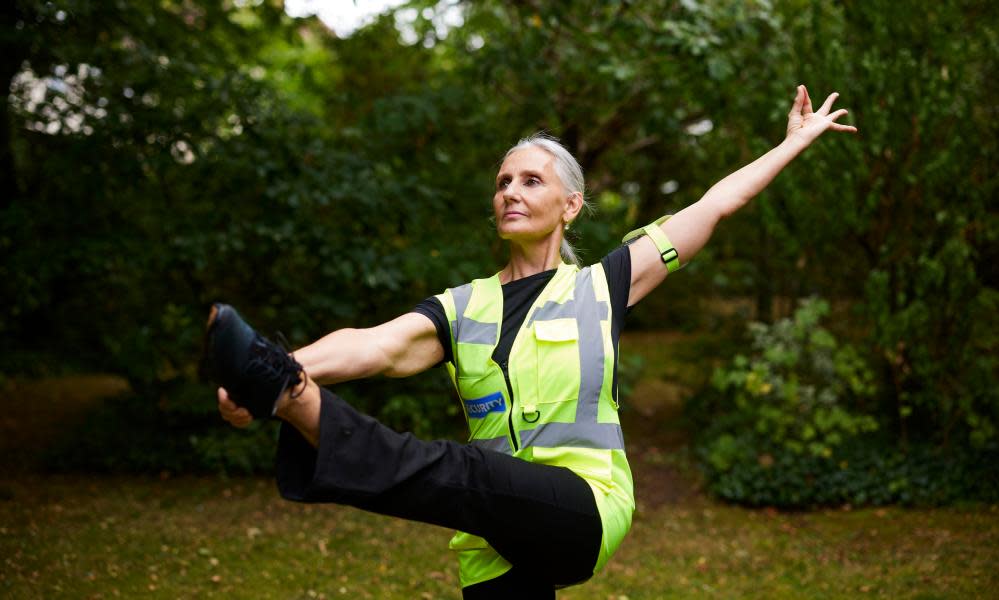A new start after 60: ‘I became a security guard at 66. Am I ever scared? No’

Anne-Marie Newland is a mistress of career change. By the time she opened her shop, Sweet Charity, in Kensington Market in 1982, selling psychedelic clothing to, among others, Annie Lennox and Kim Wilde, she was 25 and had already pursued several paths. At 19, she had choreographed dancers for Vangelis and covered classes for Arlene Phillips, who had taught Newland at Arts Educational London (she was then Anne-Marie Khachik).
She was a youth worker and played drums in bands, briefly with Toyah Willcox. Later, she became a “stay-home mother” to four children, “the highlight of [her] life”, and for many years she worked as a yoga teacher and trainer. But it still feels surprising to hear her say that, at 66, she qualified as a security guard.
As about-turns go, the yoga mat to the security tabard feels like a sharp one. “It is all about psychology,” Newland says. As a security guard, “you have to be very observant. You have to be willing to challenge, without being aggressive. I have had antiterrorist training, terrorist-awareness training, how to arrest people, how to de-escalate.” And she has found she is good at it.
I have always felt powerless. Wearing a uniform, I feel protected
When Newland started, she enforced Covid-19 security at venues while restrictions were in place, and now manages a team at high-profile events and festivals. The job offers flexibility “and keeps you physically active”. She stands a little over 5ft tall. Is she ever scared? “No,” she says. “And that’s an interesting one. Why don’t I feel scared?”
Since childhood, Newland has had a complicated relationship with security. She was born in Iraq and spent her early years in Kirkuk, Baghdad and Basra. “We were always moving, quickly.” She was five when she saw her father arrested at gunpoint. “He was a political prisoner” – accused of taking papers from the university where he taught draughtsmanship – “which was ridiculous.” The family fled to Leicestershire, the county Newland’s mother was from. But it was six years before her father could join them, in 1967.
At 13, Newland won a scholarship to board at the Arts Educational School in Tring, Hertfordshire. Her parents took her on the train, with her belongings in a plastic bag. “I thought, ‘I’m just going to move on,’” she recalls.
Tring was “a world of money, of privilege”. Newland seesawed between this and “abject poverty” when she went home – though she had never seen it as such before. The family slept on mattresses on the floor. But what stung most was “seeing how hard my parents worked”. Her father struggled to find employment. “He’d get a job – until they heard his voice on the phone, or they saw him, and suddenly the job was gone.” Police knocked often: “We were the only foreigners in the village.”
The disconnect between home and school “taught me how to manoeuvre the world”, Newland says. “Constantly divided between two worlds – that’s my story.” The thread that joined those worlds was work. “Primarily, no matter what I’ve done in my life, I’m a worker,” she says. She got her first job at 11, cleaning a factory floor, but applied herself as she would at Tring. That’s where she recalls a teacher saying, “If your pointed shoes aren’t full of blood, you haven’t worked hard enough.”
Related: A new start after 60: ‘I didn’t want to be an invisible old lady – so I became a yoga teacher’
Even now, she retains the feeling that “you must work until you drop”. It must have been hard, then, when Newland felt her energy leave her after Covid-19 sent her yoga teacher-training business online. “I was coming up to retirement. I thought, ‘This is a natural closing down.’”
Sometimes she wonders: “How have I ended up in security? And it occurred to me that I have always felt powerless,” she says. “It was always them and us. Wearing a uniform, I feel protected.” In a strange way, the security work has made her confront her vulnerability.
After her mother died in 2009, Newland found that she was grieving her loss, and other losses too: Iraq, the language she grew up speaking. “You can be strong for a long time and something happens and suddenly you’re not strong,” she says. “It’s like building yourself again. I want to take off all the labels, and find out who I am – the essence of me.”

 Yahoo Movies
Yahoo Movies 
